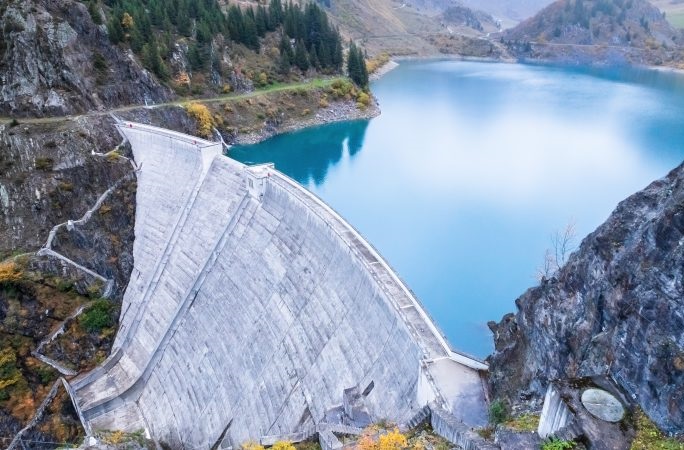11 Dec 2024

Tired Earth
By The Editorial Board

Europe’s hydropower industry is ancient as dams built at the very beginning of the 20th century continue to provide electricity to this day.
But as Brussels is getting serious about boosting wind and solar to provide almost all the bloc’s power, hydro is beginning to feel the strain.
“Hydropower is facing a number of challenges,” explained Xabier Viteri, managing director of the Spanish giant Iberdrola Renewables, who spoke in Brussels on Tuesday (24 October).
The sector’s biggest challenge? “It is the lack of a business case,” he said.
The industry’s core demands are financial support for hydropower projects and a market environment that rewards the sector’s contributions to grid stability.
While hydropower provides power system services such as stable generation and the ability to adjust electricity production flexibly to more intermittent renewables, that is not “always rewarded” by the market, Viteri remarked.
That point was emphasised by Emmanuelle Verger, from EDF Hydro, who stressed the importance of remunerating the range of services provided by hydraulic power dams – both in terms of the energy produced, but also in terms of the flexibility and system services they provide, which are currently not recognised in the EU’s electricity market design.
Moreover, the sector is hampered by regulatory barriers – such as the long lead times needed to conduct environmental impact assessments for new dams and lengthy authorisation processes, Viteri noted.
To remedy this, the European Union needs to put together a hydropower strategy, he argued – similar to what has already been done for the solar and wind industries.
However, there is currently little appetite for this in the European Commission.
Because the entire hydropower industry is based in Europe and cannot move abroad, “there’s a lesser need, in our view, for a specific hydropower strategy right now,” explained Mechthild Wörsdörfer, deputy director of the Commission’s energy department.
Industry alliance
Viteri’s speech marked the end of a three-hour event by the newly-founded EU Hydropower Alliance which brings together the industry’s 10 biggest players in their quest to get more attention from EU policymakers.
They have many arguments in their favour: hydropower produces 12% of the bloc’s electricity and is the second-largest source of renewable power – having recently been overtaken by the wind sector.
Massive systems that pump water up a hill when power is plentiful to drive turbines at times when it is scarce provide 90% of the bloc’s flexible power storage capacity.
“Hydropower is a crucial source of renewable electricity in the EU, thanks to their flexibility and large storage capacity,” said Energy Commissioner Kadri Simson, who spoke at the event.
But Europe’s hydroelectric power dams were built at a time when alternatives were few – mostly oil and coal – and environmental opposition largely inexistant.
Today, only optimal new hydropower projects are able to keep pace with ever-more cheaply available “new” renewables like wind and solar. At worst, hydropower’s price per kilowatt-hour can run eight times higher than today’s solar panels per unit of electricity produced.
Yet, proponents of hydro retort that the cost comparison does not take into account the additional balancing costs for wind and solar PV associated with their non-dispatchable nature. “We know that the adjustment to bring the ‘as generated cost’ of these technologies to a ‘equivalent baseload cost’ is quite significant, in particular for Solar PV,” argues one industry source.
Another challenge relates to the maturity of the hydropower sector, which makes significant efficiency improvements more difficult to achieve. As a consequence, hydropower was not listed by the European Commission among the eight technologies deemed strategic for the transition to a net-zero economy.
Neither was the industry included in the Commission’s proposal to revamp the bloc’s electricity market design – all reservoir-based hydropower plants will be barred from state support under the proposal.
Repowering: The industry’s future?
One hope for the industry is the repowering of old hydropower dams – a relatively low-cost operation which could provide significant additional electricity generation.
Eurelectric, the EU’s power industry association, estimates that expanding existing reservoirs could boost Europe’s pumped hydro storage capacity by 80%.
That would also increase the EU’s capacity for longer-term storage of surplus energy, which is becoming more pressing due to the increasing share of intermittent wind and solar power added to the electricity system.
“We see the potential mainly in storage,” Wörsdörfer explained.
According to Energy Commissioner Kadri Simson, repowering hydropower plants has also become easier as renewables are granted the status of being “of overriding public interest”.
But while most know hydropower for its massive Alpine dams, which act as a “battery” for the electricity system, the picture looks different for river dams.
Indeed, most hydropower dams in Europe are small-scale constructions placed on rivers. And because rivers are the main arteries for fish to migrate and procreate, their impact on biodiversity can be high.
“In the case of hydropower, small is not beautiful,” explains Claire Baffert, a senior water policy officer at WWF’s EU office.
In countries like Romania, 545 small-ish hydropower plants produce around 3% of the country’s electricity but threaten to extinguish several fish species, according to a report by the Leibniz Institute of Freshwaster Ecology
As a consequence, WWF and other conservation groups have been locking horns with the Commission over how much leeway should be given to developers of hydroelectric dams.
“The growth potential of hydropower in Europe is limited apart from the extension of pumped hydropower and small hydropower,” the Commission said in February. Meanwhile, environmental impacts were “typically unavoidable”, it added.
Source : euractiv.com
Comment